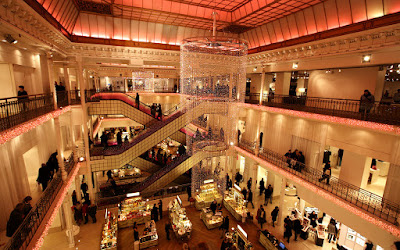Online Marketing Activities Supporting the UK Department Stores
UK
Department Stores - A department
store is a large shop which is divided into many departments. It sells many
different kinds of goods such as furnishing, clothing, footwear, toys,
cosmetics, and groceries etc. Most of them operate with a mix of own-bought and
concession departments. They largely offer store products at various pricing
levels and adding high levels of customer services by convenience all of the
products to be purchased under one roof.
Departmental stores are large-scale
retail establishments. They are mostly located in the important central places
of big cities. In stores, each department specializes in a particular kind of
trade. The main motive of the store's operation is to sell more goods to the
same customers by providing a large variety of goods than to sell the same kind
of goods to many customers.
According to study, “UK
Department Stores 2018-2023” some of the key players that are currently
working in the UK’s department stores are Selfridges, Fenwick of bond street,
Marks & Spencer, John Lewis, Harrods, Fortnum & Mason, Harvey Nichols,
Liberty London, Debenhams, Goodhood, The shop at Bluebird.
The UK department store market remains
challenging, with a number of the leading players facing a stiff competition
from each other. The best features of the stores are based upon just more than
buying products; it should be a leisure destination with a retail offering that
is stimulating and inspiring. The most important factors for department stores
are the ability to alter goods and services produced in favor of market
conditions, access to secure revenues and marketing of differentiated products
etc. Nowadays stores have reinvented themselves. They are now destination
stores for younger customers offering aspirational brands, complemented by
great own brands.
There are many advantages associated
with stores operations include shopping convenience, economies of large-scale,
wide choice, central location, liberal services, use of specialized services,
economy & advertising and the large volume of sales etc. Some of the
disadvantages are distance, higher prices, difficult to establish, lack of
coordination and absence of personal contact etc. The running expenses of the
departmental store very high due to the various services rendered by high
rents, advertising and many more.
The store's industry has a low level
of capital intensity, which reflects the labor-intensive nature of retail
industries. Department stores have a lot of staff on hand in each department to
help customers. Many department stores also have separate tills in each
department, which therefore need to be individually manned. Costs mainly
consist of depreciation on retail fixtures and fittings, buildings and other
equipment such as computers. The industry also continues to face intense
external competition from online-only retailers and the expansion of
supermarkets into non-food items. The factors may impact the growth of
departmental stores in the near futures.
Nowadays, in the UK, VR rooms and
voice-controlled robot are developing stores operations and transforming the
customer experience. These technologies up gradations are likely to reshape the
retail landscape driven by data from customers themselves. Technology can also help
to deliver “personalized” experiences such as products customers design. AI can
help to inject £27billioninvestments into the UK retail sector. The stores in
the future will also provide experiences, rather than simply focusing on
selling stock. Premium/luxury brands will have been sure to remain appealing to
shoppers and tourists. As a result, these retailers are expected to outperform
the overall growth of the department store market in the coming years.
To know more,
click on the link below:
Related
reports:
Department
Stores In Israel
Contact us:
Ken
research
Ankur Gupta,
head marketing & communications
+91-9015378249



Comments
Post a Comment